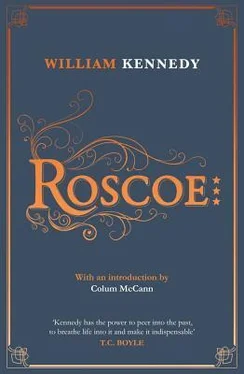“Why? Why did state troopers, working for the Governor’s special investigators, do this? Publicity was their goal. Publicity to use against the popularly elected Albany Democratic organization they so irrationally hate and seek to destroy.
“And why do they want this publicity so badly that they stoop to such tactics as arresting a detective who is making a major arrest? I’ll tell you why. I direct your attention to the great building at the top of State Street, the Capitol of New York State, where some of you work, but which is now the captive office of a gnarled and mustachioed little gnome who wants to be President of our nation — I refer to the power-maddened Governor, who will do anything to get elected. That’s why we’re here today, my friends, because of the lunacy of presidential ambition. May God deliver our city from it, and from that man so possessed by it.”
The Knickerbocker News, in its midday final, reported Roscoe’s speech on page one, with his photo in front of the Double Dutch. The paper also carried an editorial wondering why a State Police inspector would make a politically motivated misdemeanor arrest of a detective lieutenant who was arresting a surrendering murderess. “Have the State Police lost their brains?” the newspaper wondered.
In a sidebar, Cutie LaRue suggested that the Democrats nominate Roscoe as their next candidate for governor. When Roscoe read the paper, he sent a one-word telegram to Inspector Dory Dixon. “Moo,” it said.
The heat was fierce after the press conference, and the pain was niggling at Roscoe’s heart. He had never felt more vital or necessary, yet he knew he was not well. He should go home to Tivoli, let Veronica take care of him. But he could not go directly from the Double Dutch to Veronica’s presence. He went to Hattie’s, to comfort her in her time of public embarrassment.
“Gin and food is what I need,” Roscoe told Hattie, and she brought out her Canadian gin and phoned in an order to Joe’s Delicatessen for pastrami sandwiches on rye (two for Roscoe) with coleslaw and dill pickles, which Joe sent down in a taxi. They ate in front of Hattie’s parlor fans, and Roscoe apologized for not foreseeing the publication of her name in the paper. Roscoe opened his shirt to beat the heat and he thought of poor old Oke. Hattie waved the skirt of her housedress to air her thighs.
“They made a whore out of me, Rosky,” she said.
“They made me a consort of whores,” Roscoe said.
“I could’ve been a good whore.”
“Well, yes, but no. You’ve got too much heart.”
“Whores have heart.”
“Maybe at the beginning. Whoring eats your heart.”
“Everything eats your heart,” Hattie said.
“Nothing ate your heart, Hat. You’re still the love queen of Lancaster Street. How can I make this thing up to you?”
“You could love me like a husband.”
“And you’d kill me like a husband. My heart couldn’t handle it today.”
“You have to do something about that heart, Rosky, if it gets in the way of love.”
“I’ll talk to it,” Roscoe said.
Roscoe and the Silent Music
Roscoe saw Jack Diamond waiting for a trolley, and told Mac to stop and pick him up. Jack wore a shoulder holster with no pistol, disarmed in death. He didn’t say hello to Mac, but you can’t blame him. Jack, moving through the timelessness of his disgraceful memories, had insight into Roscoe’s destiny.
“Roscoe,” he said, “there’s chaos waiting for you. How will you cope?”
“I’m glad you asked that, Jack,” Roscoe said. “I’ll cope through virtue, and virtue I’ll achieve through harmony. The musical scale, always a favorite of mine, is expressed in harmonious numbers: the octave, the fifth, and other fixed intervals, all reflecting an order inherited by this earth. An equivalently calibrated heavenly order guides our planets and stars in their harmonious trajectories, generating the music of the spheres, which, though silent, is mathematically chartable, and always a crowd pleaser. Do you agree, Jack?”
“I try to,” Jack said.
“Virtue,” said Roscoe, “comes from heeding these unseen numbers, this silent music; also from the judicious exercise of power, contempt of wealth, and a prudent diet. The virtuous warrior who inherits the mantle must, with fire and sword, expel disharmony, amputate sickness from the body, ignorance from the soul, luxury from the belly, sedition from the city, and discord from the family, thereby ending all wars, and restoring music to God’s cosmos. This is my plan of attack, Jack. What do you think of it?”
“Virtue was always one hell of an idea,” Jack said. “Let me off at the corner.”
Some People Just Have to Go
At mid-afternoon Bart Merrigan came to Hattie’s to find Roscoe and make sure he had not died of rhetoric and heat. He also brought news that Elisha’s will had surfaced for probate in Surrogate Court, Elisha’s siblings had seen it, and their lawyer wanted to talk. Roscoe was exhausted from the Notchery-Pina debacle and his worsening chest pain. He had napped at Hattie’s for two hours, not enough, and now wanted only to retreat to the tranquillity of his Tivoli rooms until the world changed. But, as usual, he lost out to his rage for duty, and would have to forgo that elegant peace and go to his office to cope with Elisha’s brother and sisters.
Elisha, on the night of his death, had shown Gladys the document naming Roscoe executor of his estate, and told her that if anything ever happened to him a family feud would erupt, but Roscoe would find “the key” to solving it. Gladys assumed he meant Roscoe would be fair with all parties in settling control of the mill. But Roscoe decided “the key” related not to fairness but to the protection of Veronica. How could Elisha assume Roscoe would be fair? Roscoe had never been fair, and who knew that better than Elisha?
Elisha’s siblings — brother Gordon, the banker, and sisters Antonia and Emily — even before Elisha’s death, had aimed to control the mill and stop what they saw as its downward slide. Their plan was to replace the inattentive, dollar-a-year Elisha with Kyle Glockner, a bright man who had risen from the rolling mill to become a superior salesman, sales manager, eventually vice-president, a man the siblings believed they could control. When Elisha died, Glockner did move into the breach, and chaos did not erupt as Gladys had feared. After the funeral, the siblings pressed Veronica to agree to joint control, with Glockner as titular head.
Veronica, with Elisha’s holdings, controlled the mill with 50 percent of common voting stock. The siblings had 45, but with Glockner’s 5 percent, given to him when he became Elisha’s vice-president, a standoff was possible. Glockner, however, a protégé of Elisha, was neither as malleable nor as friendly to the siblings as they expected, and as their dream of control faded and the mill’s postwar slide continued, the siblings urged Veronica to sell it before everybody slid into bankruptcy.
Bart drove Roscoe to Party headquarters, which was also Roscoe’s law office, one cabinet drawer holding his entire practice: the Elisha and Gilby files. The day was crisp and sunny, and a breeze had blown away the heavy heat. Roscoe, in wilted clothing, felt soiled in the shining afternoon.
“Everybody loved your speech on Pina the whore,” Bart said.
“I like to think of her as a singer,” Roscoe said.
“She gonna do any time?”
“Of course not. Have you no morality? The woman was a victim, not a murderess.”
“I hear the Dutchman’s still dead.”
“Has anybody complained about that?”
At headquarters, Roscoe reviewed the files on Elisha’s estate, then called in Mrs. Pringle, his secretary-on-call, and dictated a letter to the Fitzgibbon siblings’ lawyer, setting out estate specifics: only half a million in Elisha’s personal assets, plus Tivoli, worth another million or so, to be appraised; six hundred thousand to Veronica from Elisha’s life insurance, none of these legacies involving the siblings. The mill’s value, which did involve them, required detailed appraising. Roscoe advised them that monthly fees for himself as counsel and executor would be fifteen thousand, plus five thousand for Bart Merrigan as appraiser. Also, the mill’s holdings in other states would necessitate hiring additional lawyers and appraisers. “Sad to say,” concluded Roscoe, “the Surrogate Courts of this nation are exceedingly dilatory, and we should not expect final resolution before three to five years. Some notorious cases have continued for twenty-eight, even thirty-five years.”
Читать дальше












